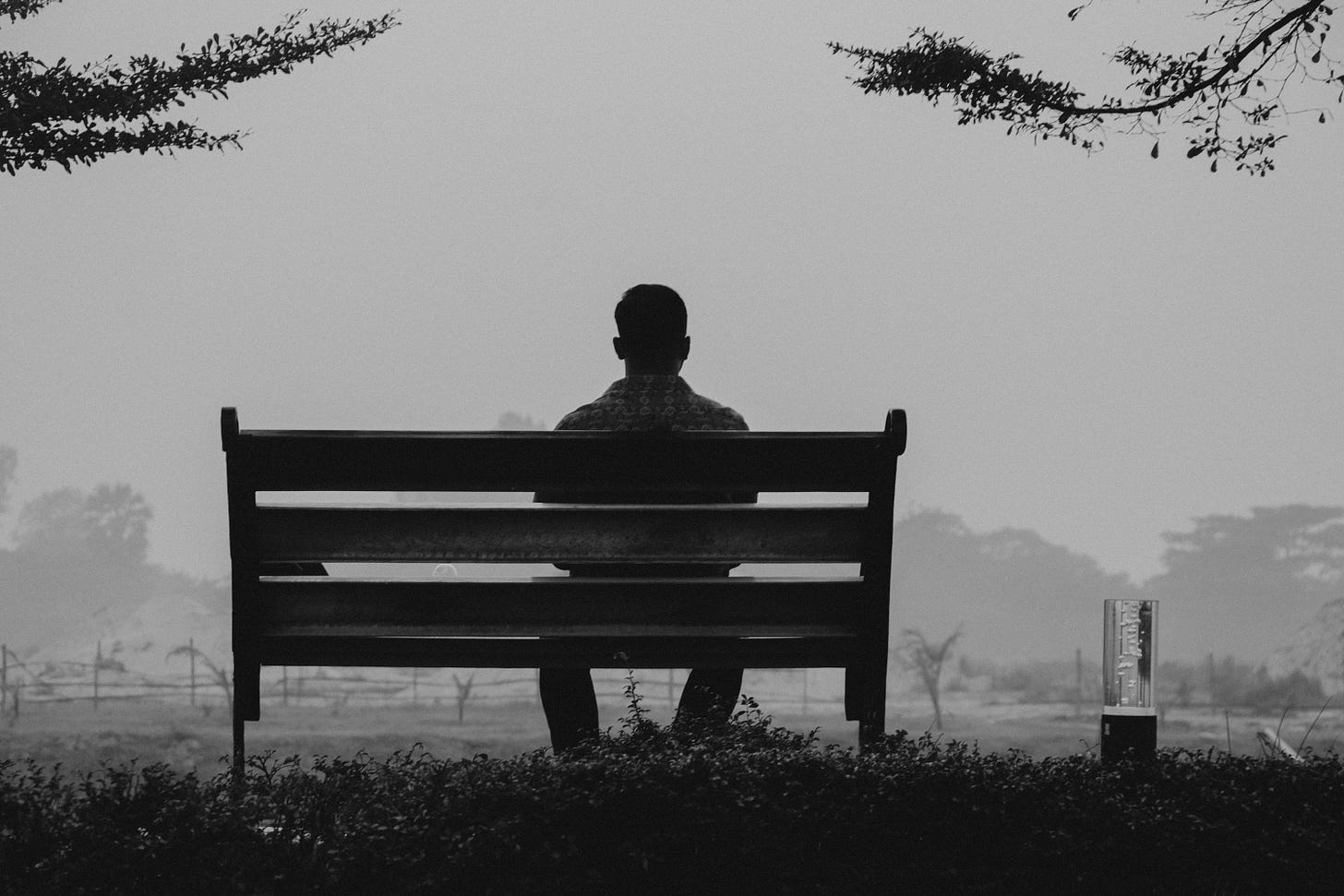Selfishness is Self-Emptying
What's the Supposed Benefit of Selfishness, Anyway?
A guest post by
of The Lady’s Quill, Catholic365, and Crisis Magazine, and an author on my Catholic satire project Irkutsk Ice TruckersOne day, while watching television, I came across a commercial from a fashion company. As most commercials seem to do nowadays, it came with a supposedly encouraging and motivating message at the end, with white letters reading, “Courage to be real.”
Such motivational lines are nothing new. You can find them anywhere from clothing brands at the store to beverage ads online. One could even say that, if there is anything we have in overabundance today, it is self-motivational messages. And they always have something in common: they are about you. Whatever the product being advertised is, the motivational line does not fail to encourage self-love and self-service.
One of the most common themes one finds among these encouraging lines is that of “being the real you.” We are constantly encouraged to be our real selves. To be bold. To be who we were meant to be. We are seldom explicitly told what we should be bold or real about. However, even when there is no outright explanation, there is an implicit message. In the realm of advertisement, this message is often conveyed through the realm of imagery.
Examining the imagery that often accompanies these self-serving messages, one once again finds a common theme: self-love and self-service in being “who you are,” through following sinful impulses. This is corroborated through continual intimation of people being selfish through how they act, or of people embracing so-called gender identities or other ideologies. A bit of thought suffices to inform one that “who one is” is determined by one’s wishes, regardless of whether they are right or wrong.
Fulfilling these desires is seen as the paramount objective, even if they run against the basic norms of decency or politeness towards others. Being the real you, satisfying your desires, is seen as more important than anything else on earth. It takes little time — probably as little as sitting through one commercial break — to confirm that this is a recurring theme in advertising today. If you give in to your desires, no matter how base they may be, you are courageous; you are worthy of admiration, because they come from you who are special, you who are unique, you who are… you.
But these types of motivating-to-self-service lines are not only restricted to advertising. As such, one cannot dismiss them as a simple marketing ploy (albeit one that truly works). They are also found everywhere on social media, even on pages explicitly dedicated to the sharing of such things.
If one were to recognize these motivational quips for what they are, one could call them exhortations to a vice every child in the world was taught to abandon just a few decades ago: selfishness. Yet now this vice, like so many others, is admired, and even marketed. Instead of reprehensible, being selfish is now seen as admirable. Instead of being immature, the one who practices selfishness is seen as a just person, giving himself what he deserves.
Now, to be clear, I do not advocate for people having such a low perception of themselves as to have them think they are worth nothing and better off dead. But there is a fine line between the two extremes of either believing one is worth less than the rubbish in the dumpster or the best, most admirable person in the world. Today, like with so many things, we find ourselves not at a healthy middle balance of self-perception, but at both extremes. We live in a time when people think so little of themselves that suicide and euthanasia are commonplace, yet at the same time, they think so much that pride is both an admired and encouraged trait. We live in a world of contradictions — where no sooner is a statement made than it is contradicted by actions or even once again by words, and no one cares, because it is such a mad world that few people either notice or are bothered by it.
People are encouraged to give in to their vices because that is “being themselves” — even when such things harm them. Everyone is encouraged to follow their dreams because they come from their heart, no matter how many lives might be affected by their actions in the process. And the greatest success is measured in “being yourself” — no matter if you become a degenerate, base creature in the process.
Around the same time I saw the first commercial, I encountered another one, this time advocating for fake meat to solve the “meat problem.”
We live in a world full of “real” people who want fake things. These people, supposedly so real and true to themselves, do not possess enough gumption to face real things. And I am not only speaking about meat anymore. Meat, I would say, is among the least of our problems (although I would not eat the fake version of it if they paid me). I am referring to the reticence we have nowadays when it comes to looking vexing situations in the eye and countering them face to face, simply because they are hard to manage and cause us to feel anxiety.
We prefer online confrontations because face-to-face discussions require a certain valor on our part to stand up for our opinions. We prefer sitting with our phones rather than with other people because the latter requires patience and attention. We want religion, but we do not want the effort that must come with it. We take pride in calling ourselves adventurous — we travel and climb places, define ourselves as rugged and lovers of danger — but cannot bring ourselves to enter into marriage because of the risks involved. We call ourselves determined and take on great projects at work, but will do anything to stay away from home and face the troubles we find there. So eager are we to be our real, true selves that we are not even capable of accepting our own sex.
The situation has become so dire that there are now men who look for an “AI girlfriend” instead of a real woman. After all, she doesn’t need to be won over. She does not require the nerve to ask her out. You don’t have to worry about her saying no. She will be there always and everywhere for you, at the click of a screen. Whether you are good to her or not does not matter, because she will not know — and if “she” did know, it would still not matter, because AI isn’t human, and you can just turn off the device anytime you want.
We have become such real, fake people that we can no longer stand real things. We are such real versions of ourselves that we no longer care about living a regularly happy life anymore. We instead choose to waste our time sitting on the couch, scrolling on — and staring at — a glass screen all day because it is the safer route. We prefer to stay in a lethargic, sinful way of life that deep down leaves us feeling miserable and empty because it is hard to get out of, and instead call it “being ourselves.” We are human simply because that is what we were born. From then on, we live in a glass house that represents our feelings, afraid to do anything lest it shatter and hurt us.
It is in this age of inhumanity that we are taught to place fear and comfort above everything, even above being human. And to counter the emptiness that comes from this, we are taught to replace it with a selfish concern for ourselves and a pompous perception of who we are to tell us that all we need is us. Whether it concerns a sinful life that ultimately ends in emptiness and discontent, or a lonely one governed by fear and an exaggerated concern for comfort, we are constantly bombarded by the message: you, you, you — until we have no space to realize that self-service and self-idolatry end in nothing.
What, then, do we learn from all of this? From this, we learn that we should be ourselves, but in the only way that can make us real and true: being the way God created us to be and living according to His rules. That also means that we ought to be human, and in doing so patiently suffer whatever comes our way. What I mean by this is living a balanced life that enjoys the good here on earth while always keeping one’s eye on Heaven, in eager expectation and preparation for the life to come.1 There is no humanity in living in a protective sleeve, for we can never be fulfilled by our own pride and ourselves, nor was that how God intended us to be.
Addendum — JRG: In other words, as philosopher Rene Girard realized in his theory of mimetic desire, the more one tries to merely fulfill one’s own desires, the less free and the more bound by your peers, lower appetites, and surroundings they become. See two articles here on Grain of Wheat about Girard and this exact topic here:
Or as a monastic proverb puts it: If you die before you die, when you die you will not die.







The attitude you so deftly describe reeks of Ayn Rand. That's why I find libertarianism the most repugnant of political philosophies. A lot of people would be better off making an Ignatian retreat with some good priests. Reading Chris Ferrara's books on libertarianism and liberty would also help.